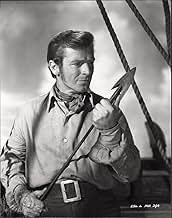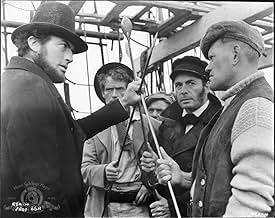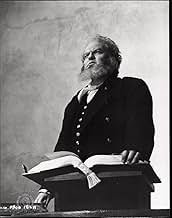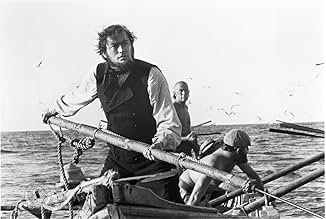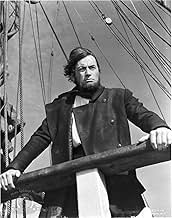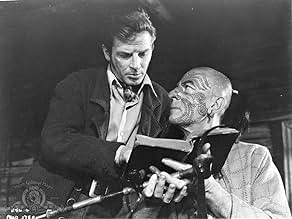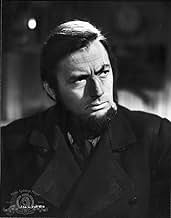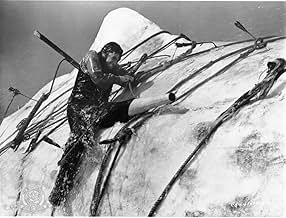IMDb-BEWERTUNG
7,3/10
23.216
IHRE BEWERTUNG
Der einzige Überlebende eines gesunkenen Walfangschiffs erzählt die Geschichte der selbstzerstörerischen Besessenheit seines Kapitäns, den weißen Wal Moby Dick zu erlegen.Der einzige Überlebende eines gesunkenen Walfangschiffs erzählt die Geschichte der selbstzerstörerischen Besessenheit seines Kapitäns, den weißen Wal Moby Dick zu erlegen.Der einzige Überlebende eines gesunkenen Walfangschiffs erzählt die Geschichte der selbstzerstörerischen Besessenheit seines Kapitäns, den weißen Wal Moby Dick zu erlegen.
- Auszeichnungen
- 5 Gewinne & 4 Nominierungen insgesamt
Friedrich von Ledebur
- Queequeg
- (as Friedrich Ledebur)
Tamba Allen
- Pip
- (Nicht genannt)
Empfohlene Bewertungen
In the 1960s English professors and film critics delighted in bashing this film. The professors took the line that the movie wasn't Melville, while the critics dismissed Peck's interpretation of Captain Ahab as "stiff." Neither view holds up well today.
Huston's "Moby Dick" isn't the whole book, but what film is? Though he doesn't give you the breadth or the depth, Huston does deliver much of the spirit and heart of the novel. The production values are splendid and the supporting players outstanding. No one can top Orson Welles as Father Mapple, but Leo Genn's Starbuck comes close. My only complaint is with Richard Basehart, who was a good actor but at 42 much too old for Ishmael, who I believe is in his early 20s. Stray thought - I wonder what James Dean would have done with Ishmael?
As for Peck, who else could have attempted this role in the mid-50s? John Wayne? Gary Cooper? Let's be serious. Sterling Hayden (who actually was quite a sailor) had the proper face and frame, but Hayden was never a box office draw and likely wasn't considered. More to the point, Peck was a much better actor. Though a bit young for Ahab, he certainly conveys both the man's insanity and his magnetism, which of course are inseparable. In so many films ("Twelve O'Clock High", "Pork Chop Hill", "The Guns of Navarone"), Peck was nothing if not a leader. Here he leads convincingly, which is essential, for Ahab is not Captain Quegg. In spite of everything Ahab's men do not mutiny, they follow him down, and with Peck in the role you accept it. Was he stiff? Well, try walking around with a pegleg. You'll probably feel a bit stiff yourself. Better to call Peck's Ahab rigid and unflinching, qualities that are central to the character. I have not seen Patrick Stewart's interpretation, but I doubt his Ahab achieves either Peck's demonic fury or his stone-hearted resolve.
There have been few better films of life at sea and few better interpretations of classic literature. "Moby Dick" is a treasure grown richer with age.
Huston's "Moby Dick" isn't the whole book, but what film is? Though he doesn't give you the breadth or the depth, Huston does deliver much of the spirit and heart of the novel. The production values are splendid and the supporting players outstanding. No one can top Orson Welles as Father Mapple, but Leo Genn's Starbuck comes close. My only complaint is with Richard Basehart, who was a good actor but at 42 much too old for Ishmael, who I believe is in his early 20s. Stray thought - I wonder what James Dean would have done with Ishmael?
As for Peck, who else could have attempted this role in the mid-50s? John Wayne? Gary Cooper? Let's be serious. Sterling Hayden (who actually was quite a sailor) had the proper face and frame, but Hayden was never a box office draw and likely wasn't considered. More to the point, Peck was a much better actor. Though a bit young for Ahab, he certainly conveys both the man's insanity and his magnetism, which of course are inseparable. In so many films ("Twelve O'Clock High", "Pork Chop Hill", "The Guns of Navarone"), Peck was nothing if not a leader. Here he leads convincingly, which is essential, for Ahab is not Captain Quegg. In spite of everything Ahab's men do not mutiny, they follow him down, and with Peck in the role you accept it. Was he stiff? Well, try walking around with a pegleg. You'll probably feel a bit stiff yourself. Better to call Peck's Ahab rigid and unflinching, qualities that are central to the character. I have not seen Patrick Stewart's interpretation, but I doubt his Ahab achieves either Peck's demonic fury or his stone-hearted resolve.
There have been few better films of life at sea and few better interpretations of classic literature. "Moby Dick" is a treasure grown richer with age.
This is a film that becomes part of you. I used to watch it over and over again on TV when it was shown during my childhood in the 1960's, and I never tire of watching it. And whenever I find myself living somewhere away from the ocean, the longing is intense to find water again. "Call me Ishmael".
The screenplay was written by Ray Bradbury, and it was his first. In his lectures and interviews, Bradbury always seems to tell the story of how John Huston contacted him out of the blue for this assignment. Evidently, he flew Bradbury and his wife to Ireland, where the science fiction writer was holed up in a hotel for a few weeks, in a wonderful agony of creation.
Bradbury has always been enamoured with classic novels. His book "Fahrenheit 451" told us how great literature somehow becomes subversive, in a controlled society. Under fascism, individuals are not encouraged to understand what it is to be truly human. Life becomes flat, and it is a deliberate process.
Before I had a VCR, I taped this movie on an audio cassette. It was an amazing experience to see it unfold in my mind's eye.
Bradbury put his whole heart into this screenplay, and the result can never be matched.
The screenplay was written by Ray Bradbury, and it was his first. In his lectures and interviews, Bradbury always seems to tell the story of how John Huston contacted him out of the blue for this assignment. Evidently, he flew Bradbury and his wife to Ireland, where the science fiction writer was holed up in a hotel for a few weeks, in a wonderful agony of creation.
Bradbury has always been enamoured with classic novels. His book "Fahrenheit 451" told us how great literature somehow becomes subversive, in a controlled society. Under fascism, individuals are not encouraged to understand what it is to be truly human. Life becomes flat, and it is a deliberate process.
Before I had a VCR, I taped this movie on an audio cassette. It was an amazing experience to see it unfold in my mind's eye.
Bradbury put his whole heart into this screenplay, and the result can never be matched.
For those folks that want great literature without having to read a 500-page tome, then this Readers Digest like condensation might be the ticket. All the high points of Moby Dick are touched on starting with 'Call me Ishmael," and so on.
As all have already pointed out, Gregory Peck has nailed the Ahab character. You got me how he managed the whalebone peg leg. The obsessive rush to take vengeance on the great whale boils in crazed Ahab's head and certainly his crew one by one catch the fever for either greed or blind allegiance. Therefore, our allegorical story full of biblical references mete out large portions of philosophical sophisms, enough for the entire Humanities Departments at fifty Universities to burn the midnight whale oil; oh, the reams of paper written about poor Moby, we're talking deforestation here.
If ever there was a story to get young men to read Lit, Moby Dick is the one.
As all have already pointed out, Gregory Peck has nailed the Ahab character. You got me how he managed the whalebone peg leg. The obsessive rush to take vengeance on the great whale boils in crazed Ahab's head and certainly his crew one by one catch the fever for either greed or blind allegiance. Therefore, our allegorical story full of biblical references mete out large portions of philosophical sophisms, enough for the entire Humanities Departments at fifty Universities to burn the midnight whale oil; oh, the reams of paper written about poor Moby, we're talking deforestation here.
If ever there was a story to get young men to read Lit, Moby Dick is the one.
When John Huston was casting for Moby Dick he got to make it on condition that he get a name actor to play Ahab. He went to Gregory Peck who was surprised by the offer. Given his image and the roles he had played up to that time, Peck thought he'd be better cast as Starbuck the first mate. Nevertheless he agreed to do Ahab.
Peck got mixed reviews at the time, but over the course of 50 years his performance has gotten better with time. The film itself which was shot in Ireland and Wales has also aged well. It's a nice depiction of life on a whaling ship in the 1840s and the crew of the Pequod are nicely cast in their roles.
Orson Welles was set to do his own adaption of Moby Dick and canceled his film when he heard his friend John Huston was doing Moby Dick. Welles asked about doing Ahab, but was given the small role of Father Mapple, the minister who blesses the Pequod's voyage. In fact Huston gave Welles a free hand to do the scene as he saw fit and the results are gratifying.
Of course Herman Melville's novel is about obsession and vengeance. I've always thought the point of Moby Dick is that the evil white whale who Ahab so personalizes and demonizes is just a whale doing his whale thing trying to stay alive. It is in fact the whalers who hunt him and his kind. And Ahab losing his leg is what we would call an occupational accident. The evil is how Ahab seduces the whole crew into his own madness, even first mate Starbuck, played winningly by Leo Genn who is the voice of reason and civilization.
Other cast members to note are Harry Andrews as second mate Stub, Friedrich Ledebuhr as Queequeg the Pacific Islander harpooner, and of course Richard Basehart as Ishmael who tells the tale.
Peck got mixed reviews at the time, but over the course of 50 years his performance has gotten better with time. The film itself which was shot in Ireland and Wales has also aged well. It's a nice depiction of life on a whaling ship in the 1840s and the crew of the Pequod are nicely cast in their roles.
Orson Welles was set to do his own adaption of Moby Dick and canceled his film when he heard his friend John Huston was doing Moby Dick. Welles asked about doing Ahab, but was given the small role of Father Mapple, the minister who blesses the Pequod's voyage. In fact Huston gave Welles a free hand to do the scene as he saw fit and the results are gratifying.
Of course Herman Melville's novel is about obsession and vengeance. I've always thought the point of Moby Dick is that the evil white whale who Ahab so personalizes and demonizes is just a whale doing his whale thing trying to stay alive. It is in fact the whalers who hunt him and his kind. And Ahab losing his leg is what we would call an occupational accident. The evil is how Ahab seduces the whole crew into his own madness, even first mate Starbuck, played winningly by Leo Genn who is the voice of reason and civilization.
Other cast members to note are Harry Andrews as second mate Stub, Friedrich Ledebuhr as Queequeg the Pacific Islander harpooner, and of course Richard Basehart as Ishmael who tells the tale.
"We are all killers, on land and on sea," wrote Herman Melville more than 100 years ago. But the artistic failure of a recent television adaptation of his greatest work shows that some are killers, too, on screen. Movie makers. Butchers. Their guts are now gorged with Moby Dick.
"Majestic" raved "TV Guide" about USA Network's production of Melville's book. Reading that review I had a fantasy where Captain Ahab, with his sublime limp, walks into the magazine's office, shoves director John Huston's 1956 film of Moby Dick into the VCR, points to the screen and defiantly exclaims:
"There's majesty for you . . . "
. . . in the faces of men. Huston's film benefits from its intelligent casting of the seamen. The actors in the recent production are just pretty-boy imports from Los Angeles, rabble-rousers lacking the dignity that is gained from a lifetime of duty. But that dignity is plainly visible on the rugged faces of the men in the earlier film. One rarely sees that anymore.
. . . in the faces of women, too. The images of the women suffering as they watch their men go off to sea are utterly devastating, they hold so much emotional depth, so much beauty. The attention to detail in Huston's film is striking: the hairs on the chins of the old women, the tired, thick-skinned expressions of the wives and widows, the heavy shawls covering their heads.
. . . in the performances. Over 40 years ago when Orson Welles gave his performance as Father Mapple (a role which only a person with a special kind of magnificence could successfully take on), Gregory Peck might have been busily preparing for his role as Captain Ahab in the same film. What a testament to Peck's stature as one of our leading actors that throughout his career he could play not only Captain Ahab but also, in the recent production, Father Mapple.
. . . in the color. Huston's film is in Technicolor, a technique which produced colors not even seen in nature. The sky is now blue now red now green. The water is brown, pink, gray. Colors blend. Colors clash. By comparison, how banal the colors of our post-Technicolor world!
. . . in the mouth. The seamen have the exquisite mouths of pipe-smokers. The upper lip tight and stiff after so many hours pulled down in the puff.
. . . in the eyes. My favorite scene is where Peck as Captain Ahab famously proclaims: "Speak not to me of blasphemy. I'd strike the sun if it insulted me." The lighting, the acting, everything here is superb. The camera is focused tightly on Peck's face. The stark appearance of his eyes -- the tense, black irises all surrounded by gleaming white -- seems to reveal the subtext of the story. His eyes electrify!
John Huston's film says more in its two hours than USA Network's says in four; it suggests a lot and explains little, whereas the latter tries to explain a lot but says nothing. A great film, it doesn't butcher Melville's Moby Dick but adds to its power.
"Majestic" raved "TV Guide" about USA Network's production of Melville's book. Reading that review I had a fantasy where Captain Ahab, with his sublime limp, walks into the magazine's office, shoves director John Huston's 1956 film of Moby Dick into the VCR, points to the screen and defiantly exclaims:
"There's majesty for you . . . "
. . . in the faces of men. Huston's film benefits from its intelligent casting of the seamen. The actors in the recent production are just pretty-boy imports from Los Angeles, rabble-rousers lacking the dignity that is gained from a lifetime of duty. But that dignity is plainly visible on the rugged faces of the men in the earlier film. One rarely sees that anymore.
. . . in the faces of women, too. The images of the women suffering as they watch their men go off to sea are utterly devastating, they hold so much emotional depth, so much beauty. The attention to detail in Huston's film is striking: the hairs on the chins of the old women, the tired, thick-skinned expressions of the wives and widows, the heavy shawls covering their heads.
. . . in the performances. Over 40 years ago when Orson Welles gave his performance as Father Mapple (a role which only a person with a special kind of magnificence could successfully take on), Gregory Peck might have been busily preparing for his role as Captain Ahab in the same film. What a testament to Peck's stature as one of our leading actors that throughout his career he could play not only Captain Ahab but also, in the recent production, Father Mapple.
. . . in the color. Huston's film is in Technicolor, a technique which produced colors not even seen in nature. The sky is now blue now red now green. The water is brown, pink, gray. Colors blend. Colors clash. By comparison, how banal the colors of our post-Technicolor world!
. . . in the mouth. The seamen have the exquisite mouths of pipe-smokers. The upper lip tight and stiff after so many hours pulled down in the puff.
. . . in the eyes. My favorite scene is where Peck as Captain Ahab famously proclaims: "Speak not to me of blasphemy. I'd strike the sun if it insulted me." The lighting, the acting, everything here is superb. The camera is focused tightly on Peck's face. The stark appearance of his eyes -- the tense, black irises all surrounded by gleaming white -- seems to reveal the subtext of the story. His eyes electrify!
John Huston's film says more in its two hours than USA Network's says in four; it suggests a lot and explains little, whereas the latter tries to explain a lot but says nothing. A great film, it doesn't butcher Melville's Moby Dick but adds to its power.
Wusstest du schon
- WissenswertesGregory Peck initially blamed the poor reviews of his performance on the script, which he felt contained "too much prose from the novel". However, he later acknowledged that he had been too young for the part at 38, since Captain Ahab was supposed to be an old man at the end of his career (Ahab's age, as implied in the book's chapter "The Symphony", is 58). He added, "The film required more. At the time, I didn't have more in me." and apologized to the screenwriters. Director John Huston admitted he didn't want Peck as Ahab, but had spoken very highly of him & was very satisfied with his performance.
- PatzerThe way the ship was moved away from the pier was incorrect. The crew is shown hauling a line from the pier. This would not make the ship move forward. To move a ship out of the harbor, it is therefore, necessary to provide something to pull against. A special anchor, called a kedging anchor, is carried as far from the ship as possible by the longboat and then dropped to the seabed. The remaining crew pull the ship out to it winding the line around the capstan or winch, and then it is hauled up and the process repeated as many times as necessary.
- Zitate
Captain Ahab: From hell's heart I stab at thee; for hate's sake I spit my last breath at thee. Ye damned whale.
- Crazy CreditsThe film finishes with 'Finis' instead of the usual 'The End'.
- VerbindungenEdited into De 7 Dødssyndene: Latskap (2007)
Top-Auswahl
Melde dich zum Bewerten an und greife auf die Watchlist für personalisierte Empfehlungen zu.
Details
- Erscheinungsdatum
- Herkunftsland
- Sprache
- Auch bekannt als
- Herman Melville's Moby Dick
- Drehorte
- Youghal, County Cork, Irland(harbour: New Bedford - departure of The Pequod)
- Produktionsfirma
- Weitere beteiligte Unternehmen bei IMDbPro anzeigen
Box Office
- Budget
- 4.500.000 $ (geschätzt)
- Weltweiter Bruttoertrag
- 353 $
- Laufzeit1 Stunde 56 Minuten
- Seitenverhältnis
- 1.66 : 1
Zu dieser Seite beitragen
Bearbeitung vorschlagen oder fehlenden Inhalt hinzufügen



